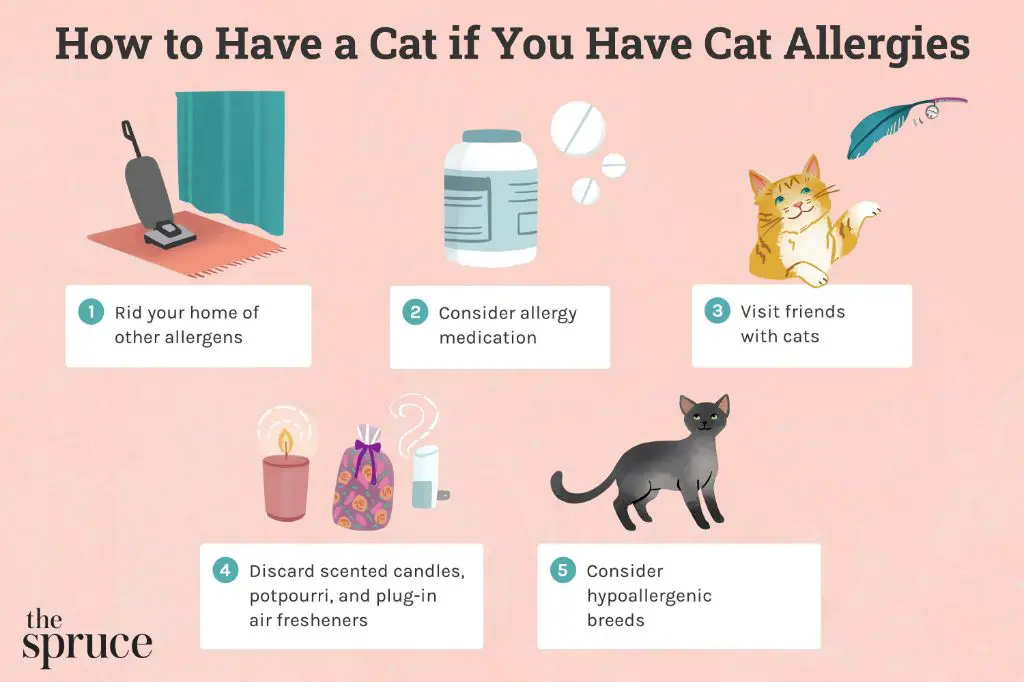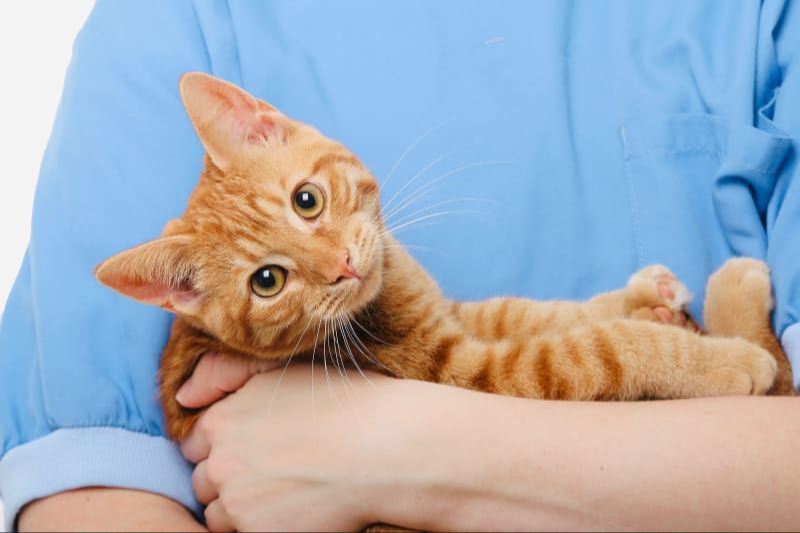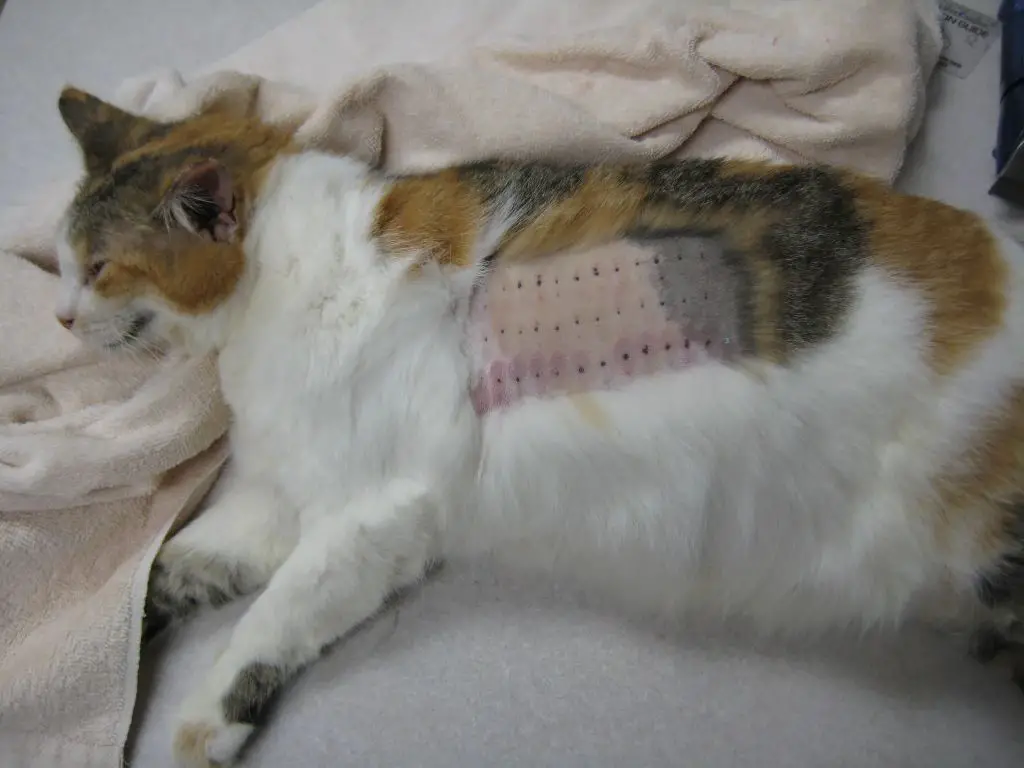What Causes Cat Allergies?

Cat allergies are caused by an immune response to a specific protein called Fel d 1, which is produced by cats. Fel d 1 is found in cats’ skin, saliva, and urine.1 This protein is extremely lightweight and spreads easily through the air when cats groom themselves. In people who are allergic, the immune system produces antibodies called immunoglobulin E (IgE) that react to Fel d 1.2 These IgE antibodies trigger the release of chemicals like histamine, which cause the symptoms associated with cat allergies.
Symptoms of Cat Allergies
According to the American College of Allergy, Asthma and Immunology, some common cat allergy symptoms include:
– Sneezing or a runny or stuffy nose
– Itchy, watery eyes
– Wheezing, coughing, chest tightness and shortness of breath
– Facial pain from nasal congestion
– Rashes, hives and itchy skin
Cat allergies cause an allergic reaction when a person’s immune system overreacts to the Fel d 1 protein found in cat dander, saliva and urine. This causes the body to release histamines and other chemicals that lead to allergy symptoms.
For people with cat allergies, exposure to cats can quickly trigger sneezing fits, runny noses, watery eyes and other classic allergy signs. Wheezing, coughing and chest tightness are also common when cat allergies flair up.
In more severe cases, cat allergies can cause skin reactions like hives, rashes or itchy skin. The allergy symptoms tend to appear within minutes or hours after exposure to a cat and can last for hours or days.
Why Might Cat Allergies Cause Coughing?
Cat allergies can cause coughing because the allergic reaction leads to inflammation in the respiratory tract. When someone is allergic to cats, exposure to proteins in cat dander, saliva, or urine triggers an immune response. The body releases antibodies like immunoglobulin E (IgE), which causes mast cells in the respiratory system to release histamine and other chemicals that lead to inflammation (Source).
This inflammation causes swelling and irritation of the nasal passages, throat, and lungs. As the airways become restricted, it triggers coughing, wheezing, and tightness in the chest. The inflammation leads to increased mucus production as well, which can further block airflow and provoke coughing (Source). Even after exposure ends, the inflammatory response can persist, leading to chronic coughing and increased sensitivity.
In summary, cat allergies commonly lead to coughing because the allergic reaction causes respiratory inflammation that irritates the airways and provokes coughing reflex. Controlling allergen exposure and treating the inflammation are key to reducing cat allergy cough symptoms.
Other Causes of Coughing

Cat allergies are not the only cause of chronic coughing. Some other common causes include:
Colds, flu, pneumonia, and bronchitis – Cough is a primary symptom of illnesses like the common cold, influenza, pneumonia, acute bronchitis, and bronchiolitis. These are usually caused by viral or bacterial infections and often resolve within a few weeks as the infection clears. See references (1), (2).
Asthma – Asthma causes airway inflammation and narrowing, which can lead to chronic coughing, especially at night or with exercise. Inhaled corticosteroids are commonly used to reduce inflammation in asthmatic patients. See reference (3).
Acid reflux – Stomach acid that backs up into the esophagus can trigger coughing. This is called gastroesophageal reflux disease (GERD). Avoiding foods that worsen reflux and taking antacids can help manage cough from GERD. See reference (1).
Smoking – Both active smoking and secondhand smoke exposure can cause coughing as smoke irritates the lungs and airways. Quitting smoking and avoiding secondhand smoke are recommended to prevent smoking-related coughs. See reference (2).
Managing Cat Allergy Cough
If you develop a cough due to cat allergies, there are several ways to help manage the symptoms:
Take over-the-counter antihistamines like cetirizine (Zyrtec) or loratadine (Claritin) to reduce allergy symptoms. Decongestants such as pseudoephedrine may also help relieve nasal congestion and postnasal drip that can cause coughing (1).
Use inhalers as prescribed by your doctor. Inhaled steroids or bronchodilators can help control allergy-induced coughing and wheezing (2).
Avoid exposure to cat dander as much as possible. Keep cats out of your bedroom, vacuum and dust regularly, and consider an air purifier. Reducing contact with allergens can minimize cough symptoms.
See an allergist about immunotherapy. Allergy shots or sublingual drops can help desensitize your immune system to cat allergens over time, potentially reducing coughing.
Relieving Coughing Symptoms
There are several methods that can provide relief for cat allergy cough symptoms:
Drinking warm liquids like tea, coffee, or soup can help soothe an irritated throat and loosen mucus to reduce coughing. According to WebMD, sucking on cough drops or hard candy can also ease a dry cough by coating and soothing the throat1.
Taking a teaspoon of honey may coat and soothe an irritated throat to reduce coughing fits. Honey has antioxidant and antimicrobial properties that can relieve coughs2.
Over-the-counter cough medicines can help suppress the urge to cough. Cough suppressants, expectorants, and mucolytics may provide relief for cat allergy cough symptoms.
Using a humidifier or taking steamy showers can help loosen mucus and provide moisture to soothe irritated airways. The moist air can make coughs more productive and less frequent.
Getting adequate rest and sleeping with the head elevated can allow the body to heal and reduce coughing episodes.
When to See a Doctor

In most cases, a cough due to a cat allergy will improve on its own within a few weeks. However, you should see a doctor if the cough persists longer than normal or is accompanied by concerning symptoms.
See a doctor right away if you have any of the following:
- Cough lasting more than 3 weeks (Mayo Clinic)
- Cough that progressively worsens or fails to improve (UnityPoint Health)
- Coughing up blood
- Severe wheezing or chest pain when coughing
Seeing your doctor quickly when you have any of these red flag symptoms is crucial. It ensures you get an accurate diagnosis and appropriate treatment for severe coughs related to cat allergies or other underlying conditions.
Diagnosing Cat Allergy Cough
If you suspect your cough may be caused by a cat allergy, see an allergist for proper diagnosis and treatment. The allergist will take a detailed medical history, asking about your symptoms and exposure to cats. They may also perform the following tests:
Allergy skin prick test – The allergist will prick your skin with a small amount of cat allergen extract. If you’re allergic, a raised bump will appear within 15 minutes. This indicates an IgE-mediated allergy.
Blood test for IgE antibodies – A blood sample can be analyzed to measure your IgE antibody levels to specific allergens like cat dander. Higher levels indicate an allergy.
Lung function tests – Spirometry measures how well your lungs work. Allergies can cause restricted airflow, which may improve after allergen avoidance.
With proper allergy testing, your doctor can confirm or rule out cat allergies as the cause of your chronic cough. This will guide appropriate treatment recommendations.
Long-Term Cat Allergy Management

For ongoing management of cat allergies, there are several long-term treatment options. The most effective step is to avoid exposure to cats as much as possible. However, this may not be feasible if you live with a cat. In that case, prescription medications and allergy shots can help build tolerance over time.
Antihistamines like cetirizine (Zyrtec) or loratadine (Claritin) can control allergy symptoms. Nasal steroid sprays can reduce inflammation in the nose. For more severe allergies, oral steroids like prednisone may be prescribed, but long-term use can have side effects.
Allergy shots or immunotherapy involves getting injections of small amounts of cat allergens. This is done once or twice weekly for up to six months, followed by monthly boosters for three to five years. Allergy shots help your body build up tolerance to cat allergens over time, eventually reducing symptoms (https://www.cats.org.uk/oxford/feature-pages/living-with-cat-allergies).
With long-term management, most people with cat allergies can keep their symptoms under control. However, symptoms may return if allergy treatment is stopped.
Coping with Cat Allergies
There are some steps you can take to cope with cat allergies if you want to keep your feline friend in the home (1):
- Keep cats out of the bedroom and limit their access to other rooms you spend a lot of time in, like the living room.
- Make sure to keep windows open and use air filters to ventilate your home as much as possible.
- Have someone else in your household bathe and groom the cat frequently.
Unfortunately, cat allergies can be very severe for some people. If your symptoms are significantly impacting your quality of life, you may need to consider rehoming your cat. While a difficult decision, finding your cat a new home may be the best option for both of your health.
(1) https://www.cats.org.uk/oxford/feature-pages/living-with-cat-allergies

